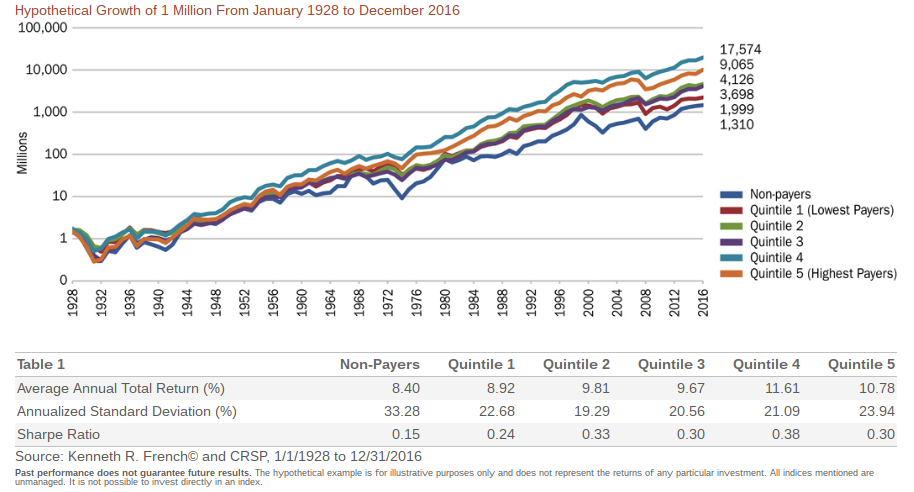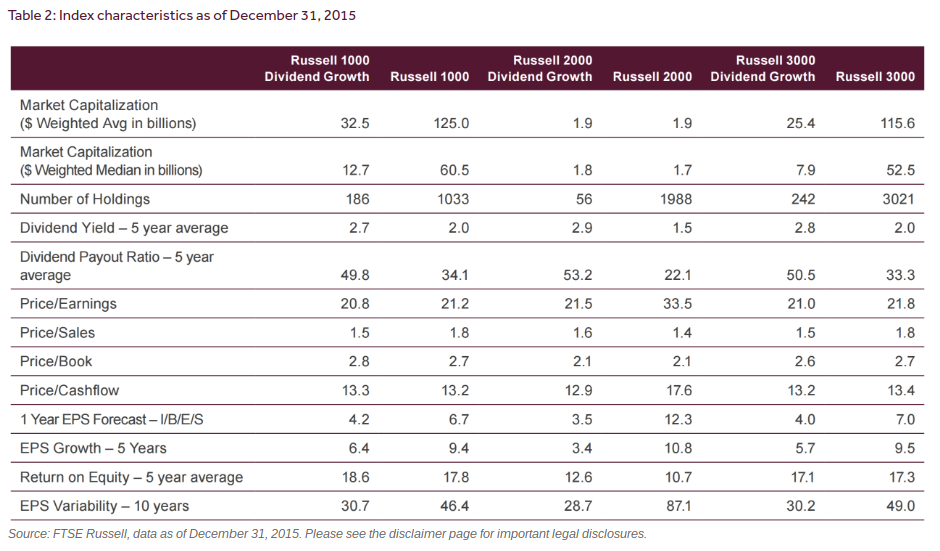A well-rounded dividend growth strategy should include income from a number of different sources and styles. Not surprisingly, the ETF industry helps address that need by offering well over 100 different funds utilizing dozens of different strategies.
The ProShares S&P 500 Dividend Aristocrats (NYSE:NOBL), for example, targets companies with decades-long histories of steady dividend growth. The Vanguard High Dividend Yield (NYSE:VYM) seeks out above average yields, while the FlexShares Quality Dividend (NYSE:QDF) looks for dividend strength and quality. Any of these highly rated ETFs would be an ideal choice for a dividend growth portfolio but most of these funds focus on the large cap space. What about dividend payers from the small cap arena?
One fund I really like is the ProShares Russell 2000 Dividend Growers (NYSE:SMDV). It uses a nearly identical strategy to its larger sibling, NOBL, in that it focuses on companies that have steadily grown their dividends for years (NOBL looks for 25 years of dividend growth history for its portfolio, while SMDV lowers the bar to just 10 years). Once the fund applies some standard tradability and liquidity screens, it equal weights the portfolio with those companies that qualify and makes sure that no single sector exceeds 30% of the overall fund. Currently, the fund holds 59 names.
Investing in dividend payers has a long history of delivering above average returns as evidenced by the chart below.

Non-dividend paying stocks as a whole have delivered higher returns with roughly one-third less risk. The sweet spot for dividend stocks is in the middle of the yield range where the risk-adjusted returns using the Sharpe ratio have historically been the highest. During its brief two-year history, the Russell 2000 Dividend Growers ETF has returned an average of 19% annually compared to an 8% annual return for the Russell 2000 index.
While small caps, in general, tend to come with higher risk than the broader market (the standard deviation of daily historical returns for the Russell 2000 Small Cap index is about 20% higher than that of the S&P 500), the focus on dividend payers produces a more conservative value tilt that drops the risk significantly.
Consider the chart below.

The difference in risk between dividend payers and non-payers is especially evident in the small cap space. The P/E ratio of the broader Russell 2000 is over 33. The Dividend Growth index, which the Dividend Growers ETF is based, has a P/E of just 21. The price/cash flow and long-term EPS variability measures show significantly lower risk as well. The drawback? Earnings per share growth is just 3%, easily the lowest of any of these groups. A 21 P/E may be low in comparison but it’s rich if there’s only 3% EPS growth. Without a multiple expansion, investors could be headed towards below average total returns unless companies can begin beating expectations in the upcoming earnings season.
One other word of caution: this fund is heavily invested in utilities. The fund’s 27% weight to this sector no doubt helps boost the yield and contribute to the conservative nature of the fund but it also exposes the portfolio to interest rate sensitivity. The sector got a nice bounce in mid-March as longer-term Treasury yields sank but keep an eye on this fund if rates begin heading north again. If the Fed delivers two more rate hikes in 2017, as it’s currently forecasting, the comparatively higher yields offered by Treasuries could cause investors to shift away from equities and towards fixed income.
Investors don’t typically look to small caps for dividend yields but the Russell 2000 Dividend Growers ETF should be considered by any investor looking to diversify their dividend income stream. The fund will likely never be a high yielder but the focus on mature, cash-rich companies that have a long history of shareholder payouts make it an ideal addition to any dividend growth portfolio.
The ProShares Russell 2000 Dividend Growers ETF (BATS:SMDV) closed at $52.45 on Thursday, down $0.65 (-1.22%). Year-to-date, SMDV has declined -2.40%, versus a 4.02% rise in the benchmark S&P 500 index during the same period.
SMDV currently has an ETF Daily News SMART Grade of A (Strong Buy), and is ranked #6 of 16 ETFs in the Small Cap Value ETFs category.
